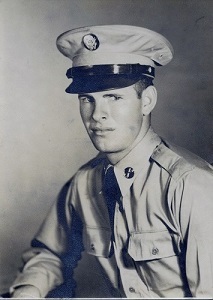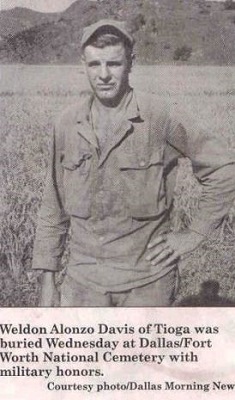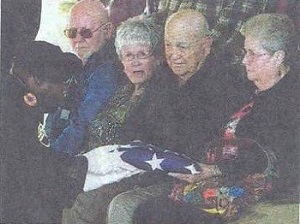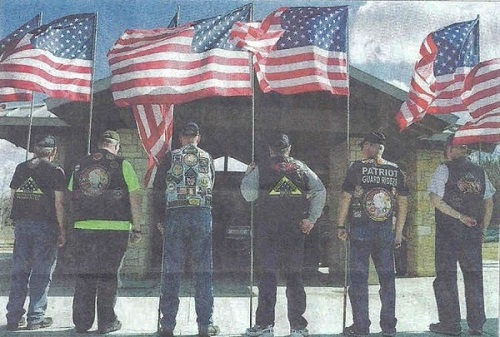PFC Weldon Alonzo Davis

Army Pfc.
Weldon Davis to return home 62 years after his death as Korean War POW
Army Pfc. Weldon Alonzo Davis is scheduled to
come home to North Texas on Monday, 62 years after he died in a Korean prisoner
of war camp.
His relatives — whose DNA made his
identification and return possible — decided to bury his remains at Dallas-Fort
Worth National Cemetery.
His family first considered burying Davis in
his hometown of Tioga.
“But then we decided he wanted to be in the
service so bad that the best place to bury him would be at the national
cemetery,” said his 77-year-old cousin, Helen White of Wylie. “We went out there
today [Wednesday] and looked at it. We made a good decision.”
Davis will be buried with military honors at
1:30 p.m. Wednesday in Dallas-Fort Worth National Cemetery.
The graveside service will end a chapter of
Davis’ life that began when he was taken prisoner on Nov. 30, 1950. He was a
member of B Battery of the 38th Field Artillery Battalion, 2nd Infantry
Division, which was trying to fight off persistent attacks by Chinese troops
pouring into North Korea.
Davis and his fellow POWs faced an ordeal
before they were finally imprisoned in Camp No. 5, near the village of
Pukchin-Tarigol, which the Americans called Camp Death Valley.
“They just marched them from one place to
another,” White said. “It was cold — real cold.”
A year ago, military recovery team members
briefed White about their ongoing efforts to recover Americans missing from the
Korean War. She learned of the harsh conditions the soldiers endured.
“I had no idea how things were for him,” she
said. “I felt so bad when I found out what these kids went through.”
Notes the researchers used included the
debriefing of a doctor, one of the POWs who treated Davis, who said the private
died on Jan. 20, 1951, of malnutrition, exhaustion and probably pneumonia,
according to Department of Defense reports. The Army set his official date of
death as March 31, 1951, because of conflicting dates given by other
POWs.
Davis was born in Tioga and lived with his
mother for about 18 months before his grandparents took him in to grow up on
their Grayson County farm.
“I knew him pretty good as the pesky little
cousin,” White said. “I can still hear my grandmother say, ‘Now Weldon, just
leave her alone.’”
Davis, who was eager to join his uncles
serving in the military during World War II, had his grandmother Fanny Davis
falsify his age so he could enlist in the Navy when he was 16.
“They found out and they discharged him in
[December] ’43,” White said. “Knowing him, he ran her nuts. He had uncles who
were in the service and that’s all he could think about. He wanted to be in the
service.”
After graduating from high school in Tioga, he
lived with relatives in Amarillo and played minor league baseball in Texas and
Oklahoma.
Davis joined the Army on Dec. 29, 1948, when
he was 22.
In Korea, Davis gave a roadside interview with
David Rasco, war correspondent for the Amarillo Globe, now the
Amarillo Globe-News.
Davis said he was looking forward to playing
catch later that day.
“After I get off duty, I’m going up to my
tent,” he told Rasco. “I got a brand-new baseball up there and me and my buddy’s
going to pitch it around a little.”
Over the years, White remembered her cousin,
especially when she saw him in family photos, “but I never thought they’d find
him,” she said. “I never thought he would come back.”
In 2005, the Defense Prisoner of War/Missing
Personnel Office discovered a shallow grave where 32 POWs, including Davis, had
been buried near the POW camp. About two years ago, the identification team
asked White for a DNA sample.
Just before Christmas, White learned the
investigators had identified her cousin using her DNA and that of her son, Mike
Hall.
“The lady from the Army told me it just
matched perfect,” she said.
The return and burial are comforting to White
and her husband, C.T. White.
“It’s good for us to know he was found and
we’re taking him to a place where he wanted to be,” he said.
JOE SIMNACHER
Staff Writer
jsimnacher@dallasnews.com
Pilot Point Post Signal
Friday, February 8, 2013
At long last
Tioga soldier who died
Korea returns home.
By Richard Greene
Managing Editor
Helen White never expected her cousin Weldon Alonzo Davis to return home.
Sixty-two years after Davis' death in the Korean War, the remains of
the soldier from Tioga returned to Texas for burial Wednesday afternoon
at the Dallas/Fort Worth National Cemetery with military honors.
"I didn't expect them to ever find him," said White, who grew up in
Tioga and lives in Wylie. "It's a relief, a satisfying feeling."
Davis' remains were found in a grave in Korea with 31 others. The
remains were sent to Hawaii, where they were matched to DNA supplied by
White and her son.

Dallas Morning News
February 2012
Texas Soldier lost in Korea
laid to rest six decades later

More
than 60 years after he died in a Korean prisoner of war camp, Army Pfc.
Weldon Alonzo Davis received a funeral with military honors Wednesday
at Dallas-Fort Worth National Cemetery. The Patriot Guard Riders
(above) stood watch at the service, and Davis; cousin Heleh W hite
(right) of Wylie was given an American flag. Davis, who was born in the
North Texas town of Tioga, was taken prisoner Nov. 30, 1950, and died
in 1951. His remains were recovered in 2005, and White learned of their
identity in December.
Published: 31 January 2013 11:23 PM Army
Pfc. Weldon Alonzo Davis is scheduled to come home to North Texas on Monday, 62
years after he died in a Korean prisoner of war camp.ago, military recovery team members briefed
White about their ongoing efforts to recover Americans missing from the Korean
War. She learned of the harsh conditions the soldiers
endured.
Biography IndexMilitary Veterans
Susan Hawkins
© 2024
Grayson County TXGenWeb




